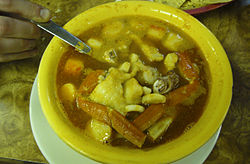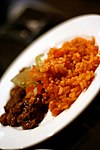
Bouillabaisse is a traditional Provençal fish soup originating in the port city of Marseille. The word is originally a compound of the two Provençal verbs bolhir and abaissar.

Menudo, also known as Mondongo, pancita or mole de panza, is a traditional Mexican soup, made with cow's stomach (tripe) in broth with a red chili pepper base. It is the Mexican variation of the Spanish callos or menudo. Similar dishes exist throughout Latin America and Europe including mondongo, guatitas, dobrada and, in Italy, trippa alla romana.
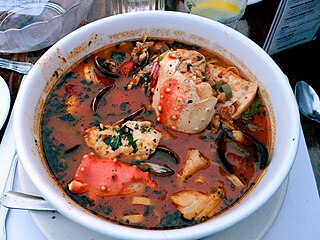
Cioppino is a fish stew originating in San Francisco, California, an Italian-American cuisine related to various fish soups in Italian cuisine.
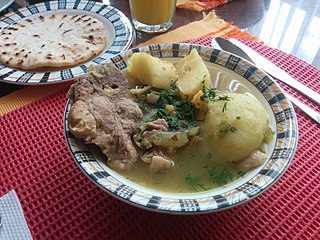
Sancocho is a traditional stew in several Caribbean cuisine and Latin American cuisines. Latin variations represent popular national dishes in Dominican Republic, Colombia, Cuba, Honduras, Mexico, Ecuador, Panama, Puerto Rico, Trinidad and Tobago, and Venezuela. It usually consists of large pieces of meat, tubers and vegetables served in a broth.

Picadillo is a traditional dish in many Latin American countries including Mexico and Cuba, as well as the Philippines. It is made with ground meat, tomatoes, and also raisins, olives, and other ingredients that vary by region. The name comes from the Spanish word picar, meaning "to mince".

Caguamanta is a typical Mexican seafood dish made with ray and shrimp. It is usually prepared as soup, containing ray, shrimp and vegetables. It also can be prepared as tacos. When the broth is served alone, it is called bichi taken from the Yaqui language word that means "naked".
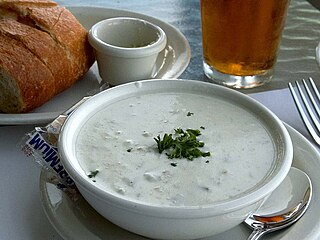
Fish soup is a food made by combining fish or seafood with vegetables and stock, juice, water, or another liquid. Hot soups are additionally characterized by boiling solid ingredients in liquids in a pot until the flavors are extracted, forming a broth.

Soup is a primarily liquid food, generally served warm or hot, that is made by combining ingredients of meat or vegetables with stock, milk, or water. Hot soups are additionally characterized by boiling solid ingredients in liquids in a pot until the flavors are extracted, forming a broth. Soups are similar to stews, and in some cases there may not be a clear distinction between the two; however, soups generally have more liquid (broth) than stews.

Prawn soup, also referred to as shrimp soup, is a soup dish prepared using freshwater or saltwater prawns as a primary ingredient. Several varieties of the dish exist in various areas of the world, including Penang prawn mee in Malaysia, Peruvian chupe de camarones, Thai kaeng som kung and Mexican caldo de camarones. Prawn and shrimp soup can be prepared as a broth- or stock-based soup, as a cream-based soup, or as a chowder. In the United States, cream of shrimp soup is mass-produced and distributed canned or frozen.
Fish stew, when not a stew pond, is a stew with a soup base or ingredient of fish as food.

The cuisine of Chiapas is a style of cooking centered on the Mexican state of the same name. Like the cuisine of rest of the country, it is based on corn with a mix of indigenous and European influences. It distinguishes itself by retaining most of its indigenous heritage, including the use of the chipilín herb in tamales and soups, used nowhere else in Mexico. However, while it does use some chili peppers, including the very hot simojovel, it does not use it as much as other Mexican regional cuisines, preferring slightly sweet seasoning to its main dishes. Large regions of the state are suitable for grazing and the cuisine reflects this with meat, especially beef and the production of cheese. The most important dish is the tamal, with many varieties created through the state as well as dishes such as chanfaina, similar to menudo and sopa de pan. Although it has been promoted by the state of Chiapas for tourism purposes as well as some chefs, it is not as well known as other Mexican cuisine, such as that of neighboring Oaxaca.

Arròs a banda is a dish of rice cooked in fish stock, typical of the coastal area of Alicante, Spain, and distinct from the paella of Valencia. It is popular up to Garraf, Barcelona (Catalonia) and down to Murcia.
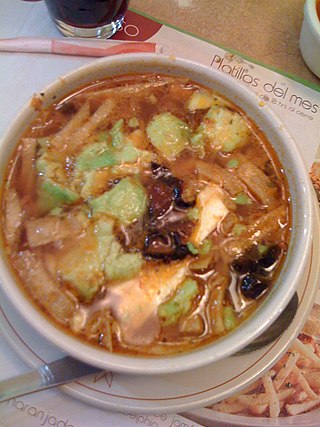
Caldo tlalpeño is a chicken and vegetable soup in Mexican cuisine which contains chicken meat, and chickpeas, carrots, and green beans, submerged in a chicken broth with garlic and onion, seasoned with epazote, cumin and chipotle chili. It is served with avocado slices and diced cheese, and accompanied with lime.
